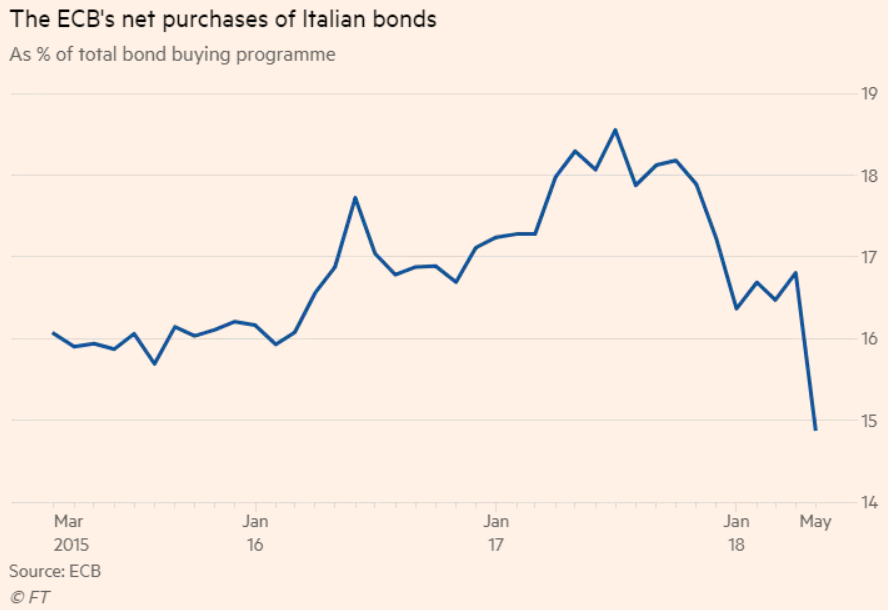Which currency would you hold over the next year? You only get three choices: the euro, the Italian lira or bitcoin.
Which do you choose?
You’ll find out my pick below.
Trying to stay more than one step ahead of the Italian crisis is proving difficult. The good news is, you don’t really have to.
It’s clear Italy is heading for a crash. However that plays out, it spells trouble for the euro and the European banking system. Which is closely tied to our own banks here in the UK too.
One way or another, there will be trouble.
Today, we look into one option to escape. But first, there’s a false narrative worth debunking…
Is the ECB behind Italy’s bond plunge?
Just as the crazy conspiracy theorists claimed, the European Central Bank (ECB) did indeed dramatically cut its purchases of Italian bonds in May:
This is clearly what’s behind the spike in Italian bond yields last week. Lega’s economic advisor, Claudio Borghi, told the Financial Times, “It is not general markets that have the greatest influence on the price; the ECB is by far the biggest factor.”
And the ECB’s actions obviously constitute interference in Italian politics. Probably at the behest of the EU. Confirming this, Jean-Claude Juncker was quick to deny it:
“I think very highly of President Mattarella, but I have not spoken to him during this crisis. I have not interfered, although I have been tempted to.
“I do not want to feed the accusations spread by the populists that we are sitting in Brussels meddling in Italy’s affairs. I am certain the Italians have a keen sense of what is good for their country. They will sort it out.”
Clearly, the crisis in Italy is serious enough for him to have to lie…
All this is the narrative that Italy’s new leading politicians are peddling. And it suits the narrative of Capital & Conflict too. The only trouble is that it’s wrong.
The ECB is not behind the Italian bond crash of May. At least not according to its own figures.
The chart above shows the proportion of total ECB purchases which went to Italy. The plunge is shocking. But that plunge occurred because the central bank reinvested a huge chunk of maturing German bonds back into German bonds. A reinvestment is done to keep things steady, not make a policy change.
The actual amount of Italian debt purchased by the ECB in May was steady. It hit a net €3.6 billion – higher than the purchases in March and January and only slightly lower than April and February.
The ECB did not trigger the Italian bond crash of May. At least not on purpose by making any big policy changes.
Unfortunately, that’s bad news for investors. Because it begs the next question: who is actually behind the plunge in Italian bonds?
And if it wasn’t the ECB, then the crash might have been very real instead of a political stunt designed to get the Italians back in line…
Escaping Europe’s currency prison
Over the past few months, you’ve read about the Target2 balances in Capital & Conflict. They signal capital flight is taking place in Italy.
What has me mystified today is where the Italian euros fleeing Italy think they’re going.
If Italy defaults and leaves the euro, that can hardly occur in a vacuum. The knock-on effects of the biggest bankruptcy in history will be vast.
Could the banking systems in the rest of Europe survive? Would other nations seek to exit the euro?
The bill to recapitalise the ECB, save the banking systems and keep the euro afloat will be huge. It might be better to call it a day and reset the currency system of each nation.
So is a euro in the German banking system really much safer than in the Italian one? It’s not entirely clear. And that means holding a euro itself is not a good idea.
Is the British banking system distant enough from Italy for a pound to be safer than a euro? That’s doubtful too, as I explained Monday.
So where will Italians turn to?
At the height of its boom, bitcoin was being soaked up and used in countries like Venezuela, Zimbabwe and China. They demonstrated bitcoin’s power to move money and protect wealth when the government clamps down.
As flawed as bitcoin may or may not be, life is a matter of alternatives. And the euro system is hardly comparing well right now…
If the eurozone crisis worsens and an entire continent of people worried about the existence of their money and banking system start to look for a way out, many will turn to bitcoin.
It’s an excellent way to punt on the coming crisis in the eurozone.
But it’s just one option for getting your money out of the system. Alongside our reports predicting and explaining the Italian crisis, Boaz Shoshan and I have provided a host of solutions at Zero Hour Alert. How to profit from collapse, and how to get your money out of the financial system.
So far, we’ve seen our predictions about Italy play out. But will we be right about how investors can protect themselves?
What’s clear is that now is the time to act.
Authors of the MoneyandBanking blog explained how quickly things will move:
To prevent (or more likely, to limit) a system-wide bank panic, an exit from the euro would have to be in the dead of night, with no prior announcement, and be accompanied by capital controls. Once applied, capital controls could take years to remove, angering those in Italy, and making those outside wary.
Until next time,
Nick Hubble
Capital & Conflict
Category: The End of Europe


